*/
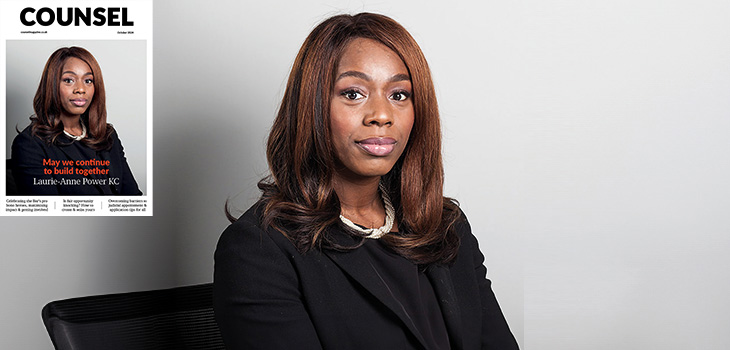
I learnt how to read at primary school in East London – but not inside the classroom. Almost daily, I was made to stand outside my classroom, next to the girls’ toilets, where I would practise reading from the notices on the walls. To this day, the smell of that particular toilet bleach evokes memories of exclusion and isolation. Looking back, I have no doubt that I was consistently excluded from my class because of the colour of my skin more so than my ‘bad behaviour’. When challenged by my conscientious parents, the headmaster told them that I had severe learning and behavioural issues and should be transferred to the local special educational needs school. But for the resistance of my parents, my journey would have had a very different ending.
In a twist of fate, shortly after I had taken silk, I was standing outside the Old Bailey when my primary school headmaster walked past me. Although now in his early 80s, I immediately knew that it was him. It’s safe to say that he was as shocked to see me in my barrister robes as I was to see him outside the Bailey on a Tuesday afternoon. As he enquired about my journey, an unexpected surge of emotion came over me; some of it positive but mostly hurt and anger. Our conversation was pleasant but what I really wanted to say was ‘Look at me now!’ without sounding like the title of a bad Netflix show. I had never held him personally responsible for the trauma of my formative education, but he was the head of an institution that stifled the dreams and ambitions of many of my peers.
Those early experiences were formative; I suspect through these I developed a resilience and realisation that I would have to work twice as hard to get half as far. Very early on in my practice, I learnt that organisation and preparation were a precondition to good practice and success. Being both a young parent and young advocate forced me to make every moment and every case count. I was relentless in building a strong practice, carving out a niche where I saw the opportunity and networking to within an inch of my life. In short, a combination of hard work and industry and being nice and respectful to people are essential to progress.
My parents were part of the Windrush generation and came to the UK from Jamaica in the early 1960s. Having met at school as teenagers, they married at 19 and had five children. Our parents instilled in us a deep-rooted sense of pride in who we were – as Black people generally, but more specifically as Black girls. We grew up in a high-rise council estate on the 11th floor. My father, who was a bass guitarist, would play reggae music loud enough for all 21 floors of our block to hear. As a Rastafarian family, we were peaceful and radical in equal measure. Many of the other residents in the block were members of the National Front (NF). Most mornings we were confronted with the usual NF rhetoric, often graffitied on the lifts or doors but also to our faces. My mother would say to us, ‘Hold your head up and tell them that they are no better than you.’ My father would simply say, ‘Fight, fight like your life depended on it.’ And so we did both.
Joining the Bar was, in part, my response to the injustice I experienced throughout my school life. I often reflect on the sacrifices made by those Black and Brown barristers who came before us, and because of their sacrifices I have always been unapologetic about my pursuit of equality at the Bar. I call out discrimination and unequal treatment whenever I see it, that is regardless of whether it is directed towards me or others. After I completed my LLB, I studied the Bar course at Northumbria University, where I lived with a small group of international students from St Lucia. I noticed that the prospect of them securing pupillage in St Lucia had nothing to do with the colour of their skin, only their grades and performance. Yet for me, I knew my skin colour would be inextricably linked to my trajectory. I was bright, confident and a strong advocate but in my mind none of that would compensate for the prejudice that would inevitably follow. To my profound disappointment, these are the same concerns voiced by pupils and prospective pupils today, almost 25 years later.
I came to the Bar as a single parent on an unfunded pupillage but with multiple scholarships from Middle Temple, where I am now a Bencher. But for those scholarships I could not have completed pupillage. I am proud of my career and achievements as a barrister. I absolutely love my job, and truly it has been an overwhelmingly positive experience, but many of my experiences at the Bar have taken me right back to standing outside the toilets of my primary school. I have dedicated my career not just to being a good lawyer, but to the fearless pursuit of equality and speaking out against discrimination. I have lost friends at the Bar because of it but I have gained allies: Black, White and Brown, united by our pursuit of equality of opportunity, and not just during Black History Month. Nonetheless, I have learnt that even well-intentioned people cannot understand what it feels like to walk into a courtroom, having achieved what I have, and be seen as a Black silk first and a good silk second.
There have been many career highlights I have enjoyed, including winning ‘Lawyer of the Year’ at the Diversity Legal Awards in 2019. In 2020, I was nominated for Lawyer of the Year at the Woman in Law Awards. Paradoxically, both awards recognised my race and gender, the two characteristics I thought would work against me.
Between 2021 and 2022 I served as treasurer to the Criminal Bar Association, and my term coincided with a full walk-out of criminal barristers from the courts over fees. It was an important time for the criminal Bar, in particular the young Bar, who bore much of the financial brunt of the walk-out. Those of us who sat on the executive committee felt a huge weight of responsibility as we successfully negotiated a 15% increase on the backlog and the commitment of an additional £7 million to other parts of the legal aid scheme during the spending review period.
In March 2022 I was appointed silk. It was by far the highlight of my career. I felt proud for my parents, who for the first time in their lives were speechless. However, something in me could not shift the sense of irritation at being called the ‘seventh Black female silk’. I felt – and still feel – that the numbers do not reflect the number of outstanding Black members of the Bar that I have worked with over the years.
Over the past 10 years or so I have sat on numerous race equality panels and been at the helm of discussions on race, law and diversity. I recently took over from Barbara Mills KC as Co-Chair of the Bar Council’s Race Panel. I am Chair of the Women in Criminal Law Race Equality Group and a former member of the Bar Standard Board Race Equality Task Force. I have been heavily involved in championing diversity at my Inn. I have also been part of a consultation team working with the Labour Party on the Equalities Act. I was also Chair of the Pupillage Committee at my chambers for four years.
One thing I have learnt throughout my journey is that deconstructing systems and mindsets which are inherently discriminatory (even subconsciously) will take time, education, training, regulation and enforcement. There can be no meaningful change unless those who hinder it by refusing to implement the necessary measures are held accountable; and until the lived experiences of people of colour at the Bar are listened to without defensiveness or deflection.
Through mentoring and working with younger members of the Bar, I am aware of some of the experiences suffered by brilliant, able and deserving Black pupils and junior tenants. Not only do many still face the kinds of barriers to the profession that my peers and I suffered over 25 years ago, but the actual experience of pupillage reported by some is appalling. This new generation, however, is robust and fearless. In recent years, organisations such as the Black Barristers’ Network and Black Pupils’ Crime Group have been set up to provide support in a safe space, in the hope that sharing experiences will spark change for the better.
It is clear that many chambers are attempting to implement the recommendations of the first Race Report. It is important, however, to be mindful that it can be triggering for a person of colour to have to provide feedback on their experiences for various reasons. Race discrimination is rarely experienced in a vacuum, but rather against a background of multiple forms of institutional discrimination. It is not the job of those who are discriminated against to solve the problem of discrimination.
I spend a great deal of time mentoring the younger generation, in academic institutions and community-based projects, about the perils of knife crime, encouraging them to pursue their career aspirations regardless, and showing young single-mothers they can pursue their careers with tenacity.
I have been blessed with an exceptional career, and truthfully, the high profile work I have done has been based on my ability not my race or gender. I spent much of my junior career being led by brilliant silks and regardless of who we are and where we come from, when doing our job, most of us have the same objective, to do it fearlessly, skilfully, diligently and with integrity.
Like many of us at the Bar, I have had lots of nice things said about me, but the one I am most proud of came from a student in a school in Hackney, who simply said, ‘Thank you for showing us what fearless looks like.’ As a profession, we are doing better but we’re still not doing enough. I am not yet convinced that all of those who say they want change, really understand what that means, what it will take or even what change would look like. The work started by Barbara Mills KC, our Chair of the Bar for 2025, Simon Regis CBE and the Bar Standards Board is exactly what was needed – a clear unequivocal starting point upon which to collaborate and build.
May we continue to build together.
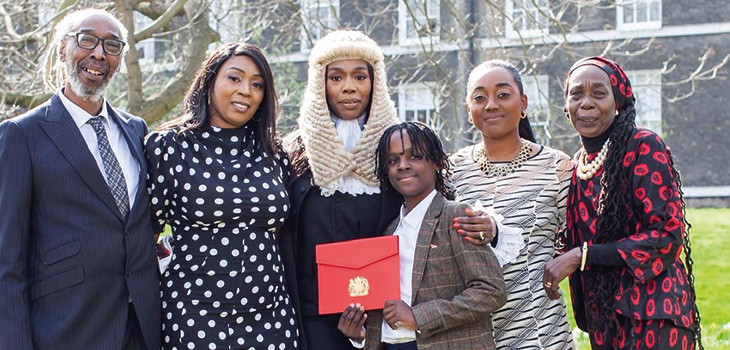
Silks Day 2022 – Laurie-Anne with her parents, her older sister Natalie and Laurie-Anne’s children Sharnika and Noah.
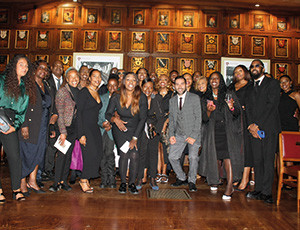
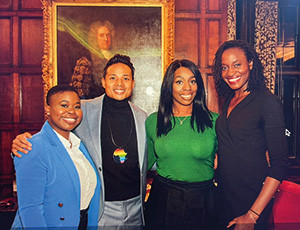
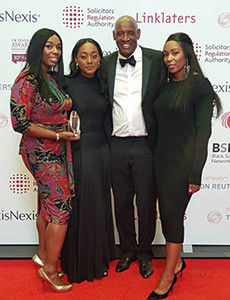
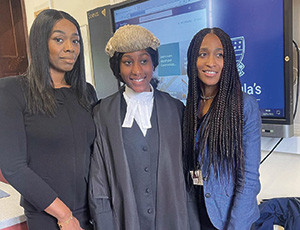

I learnt how to read at primary school in East London – but not inside the classroom. Almost daily, I was made to stand outside my classroom, next to the girls’ toilets, where I would practise reading from the notices on the walls. To this day, the smell of that particular toilet bleach evokes memories of exclusion and isolation. Looking back, I have no doubt that I was consistently excluded from my class because of the colour of my skin more so than my ‘bad behaviour’. When challenged by my conscientious parents, the headmaster told them that I had severe learning and behavioural issues and should be transferred to the local special educational needs school. But for the resistance of my parents, my journey would have had a very different ending.
In a twist of fate, shortly after I had taken silk, I was standing outside the Old Bailey when my primary school headmaster walked past me. Although now in his early 80s, I immediately knew that it was him. It’s safe to say that he was as shocked to see me in my barrister robes as I was to see him outside the Bailey on a Tuesday afternoon. As he enquired about my journey, an unexpected surge of emotion came over me; some of it positive but mostly hurt and anger. Our conversation was pleasant but what I really wanted to say was ‘Look at me now!’ without sounding like the title of a bad Netflix show. I had never held him personally responsible for the trauma of my formative education, but he was the head of an institution that stifled the dreams and ambitions of many of my peers.
Those early experiences were formative; I suspect through these I developed a resilience and realisation that I would have to work twice as hard to get half as far. Very early on in my practice, I learnt that organisation and preparation were a precondition to good practice and success. Being both a young parent and young advocate forced me to make every moment and every case count. I was relentless in building a strong practice, carving out a niche where I saw the opportunity and networking to within an inch of my life. In short, a combination of hard work and industry and being nice and respectful to people are essential to progress.
My parents were part of the Windrush generation and came to the UK from Jamaica in the early 1960s. Having met at school as teenagers, they married at 19 and had five children. Our parents instilled in us a deep-rooted sense of pride in who we were – as Black people generally, but more specifically as Black girls. We grew up in a high-rise council estate on the 11th floor. My father, who was a bass guitarist, would play reggae music loud enough for all 21 floors of our block to hear. As a Rastafarian family, we were peaceful and radical in equal measure. Many of the other residents in the block were members of the National Front (NF). Most mornings we were confronted with the usual NF rhetoric, often graffitied on the lifts or doors but also to our faces. My mother would say to us, ‘Hold your head up and tell them that they are no better than you.’ My father would simply say, ‘Fight, fight like your life depended on it.’ And so we did both.
Joining the Bar was, in part, my response to the injustice I experienced throughout my school life. I often reflect on the sacrifices made by those Black and Brown barristers who came before us, and because of their sacrifices I have always been unapologetic about my pursuit of equality at the Bar. I call out discrimination and unequal treatment whenever I see it, that is regardless of whether it is directed towards me or others. After I completed my LLB, I studied the Bar course at Northumbria University, where I lived with a small group of international students from St Lucia. I noticed that the prospect of them securing pupillage in St Lucia had nothing to do with the colour of their skin, only their grades and performance. Yet for me, I knew my skin colour would be inextricably linked to my trajectory. I was bright, confident and a strong advocate but in my mind none of that would compensate for the prejudice that would inevitably follow. To my profound disappointment, these are the same concerns voiced by pupils and prospective pupils today, almost 25 years later.
I came to the Bar as a single parent on an unfunded pupillage but with multiple scholarships from Middle Temple, where I am now a Bencher. But for those scholarships I could not have completed pupillage. I am proud of my career and achievements as a barrister. I absolutely love my job, and truly it has been an overwhelmingly positive experience, but many of my experiences at the Bar have taken me right back to standing outside the toilets of my primary school. I have dedicated my career not just to being a good lawyer, but to the fearless pursuit of equality and speaking out against discrimination. I have lost friends at the Bar because of it but I have gained allies: Black, White and Brown, united by our pursuit of equality of opportunity, and not just during Black History Month. Nonetheless, I have learnt that even well-intentioned people cannot understand what it feels like to walk into a courtroom, having achieved what I have, and be seen as a Black silk first and a good silk second.
There have been many career highlights I have enjoyed, including winning ‘Lawyer of the Year’ at the Diversity Legal Awards in 2019. In 2020, I was nominated for Lawyer of the Year at the Woman in Law Awards. Paradoxically, both awards recognised my race and gender, the two characteristics I thought would work against me.
Between 2021 and 2022 I served as treasurer to the Criminal Bar Association, and my term coincided with a full walk-out of criminal barristers from the courts over fees. It was an important time for the criminal Bar, in particular the young Bar, who bore much of the financial brunt of the walk-out. Those of us who sat on the executive committee felt a huge weight of responsibility as we successfully negotiated a 15% increase on the backlog and the commitment of an additional £7 million to other parts of the legal aid scheme during the spending review period.
In March 2022 I was appointed silk. It was by far the highlight of my career. I felt proud for my parents, who for the first time in their lives were speechless. However, something in me could not shift the sense of irritation at being called the ‘seventh Black female silk’. I felt – and still feel – that the numbers do not reflect the number of outstanding Black members of the Bar that I have worked with over the years.
Over the past 10 years or so I have sat on numerous race equality panels and been at the helm of discussions on race, law and diversity. I recently took over from Barbara Mills KC as Co-Chair of the Bar Council’s Race Panel. I am Chair of the Women in Criminal Law Race Equality Group and a former member of the Bar Standard Board Race Equality Task Force. I have been heavily involved in championing diversity at my Inn. I have also been part of a consultation team working with the Labour Party on the Equalities Act. I was also Chair of the Pupillage Committee at my chambers for four years.
One thing I have learnt throughout my journey is that deconstructing systems and mindsets which are inherently discriminatory (even subconsciously) will take time, education, training, regulation and enforcement. There can be no meaningful change unless those who hinder it by refusing to implement the necessary measures are held accountable; and until the lived experiences of people of colour at the Bar are listened to without defensiveness or deflection.
Through mentoring and working with younger members of the Bar, I am aware of some of the experiences suffered by brilliant, able and deserving Black pupils and junior tenants. Not only do many still face the kinds of barriers to the profession that my peers and I suffered over 25 years ago, but the actual experience of pupillage reported by some is appalling. This new generation, however, is robust and fearless. In recent years, organisations such as the Black Barristers’ Network and Black Pupils’ Crime Group have been set up to provide support in a safe space, in the hope that sharing experiences will spark change for the better.
It is clear that many chambers are attempting to implement the recommendations of the first Race Report. It is important, however, to be mindful that it can be triggering for a person of colour to have to provide feedback on their experiences for various reasons. Race discrimination is rarely experienced in a vacuum, but rather against a background of multiple forms of institutional discrimination. It is not the job of those who are discriminated against to solve the problem of discrimination.
I spend a great deal of time mentoring the younger generation, in academic institutions and community-based projects, about the perils of knife crime, encouraging them to pursue their career aspirations regardless, and showing young single-mothers they can pursue their careers with tenacity.
I have been blessed with an exceptional career, and truthfully, the high profile work I have done has been based on my ability not my race or gender. I spent much of my junior career being led by brilliant silks and regardless of who we are and where we come from, when doing our job, most of us have the same objective, to do it fearlessly, skilfully, diligently and with integrity.
Like many of us at the Bar, I have had lots of nice things said about me, but the one I am most proud of came from a student in a school in Hackney, who simply said, ‘Thank you for showing us what fearless looks like.’ As a profession, we are doing better but we’re still not doing enough. I am not yet convinced that all of those who say they want change, really understand what that means, what it will take or even what change would look like. The work started by Barbara Mills KC, our Chair of the Bar for 2025, Simon Regis CBE and the Bar Standards Board is exactly what was needed – a clear unequivocal starting point upon which to collaborate and build.
May we continue to build together.

Silks Day 2022 – Laurie-Anne with her parents, her older sister Natalie and Laurie-Anne’s children Sharnika and Noah.






Now is the time to tackle inappropriate behaviour at the Bar as well as extend our reach and collaboration with organisations and individuals at home and abroad
A comparison – Dan Monaghan, Head of DWF Chambers, invites two viewpoints
And if not, why not? asks Louise Crush of Westgate Wealth Management
Marie Law, Head of Toxicology at AlphaBiolabs, discusses the many benefits of oral fluid drug testing for child welfare and protection matters
To mark International Women’s Day, Louise Crush of Westgate Wealth Management looks at how financial planning can help bridge the gap
Casey Randall of AlphaBiolabs answers some of the most common questions regarding relationship DNA testing for court
Maria Scotland and Niamh Wilkie report from the Bar Council’s 2024 visit to the United Arab Emirates exploring practice development opportunities for the England and Wales family Bar
Marking Neurodiversity Week 2025, an anonymous barrister shares the revelations and emotions from a mid-career diagnosis with a view to encouraging others to find out more
David Wurtzel analyses the outcome of the 2024 silk competition and how it compares with previous years, revealing some striking trends and home truths for the profession
Save for some high-flyers and those who can become commercial arbitrators, it is generally a question of all or nothing but that does not mean moving from hero to zero, says Andrew Hillier